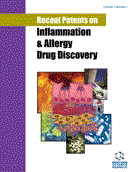Abstract
Ulcerative colitis (UC) is a chronic, relapsing and debilitating idiopathic inflammation of the gastrointestinal tract. Dysregulation of the mucosal immune response toward commensal bacterial flora together with genetic and environmental factors plays an important role in the pathogenesis. Refractory UC refers to disease that does not respond to or responds poorly to the many drugs used to treat the disease. The aim of medical treatment is to induce and maintain clinical remission. The most commonly used drugs, including mesalazine, azathioprine, 6-mercaptopurine, cyclosporine, and more recently anti-tumor necrosis factor (TNF) monoclonal antibody (e.g., infliximab), are chosen to suppress the immune system in intestinal mucosa. Additionally, colectomy may be required if medical treatments are unsuccessful or if complications develop. Some of the recent patent related to the field also discuss in this review article.
Keywords: Azathioprine, Crohn's disease, inflammatory bowel disease, 6-mercaptopurine, methotrexate, tumor necrosis factor, ulcerative colitis
 20
20


















